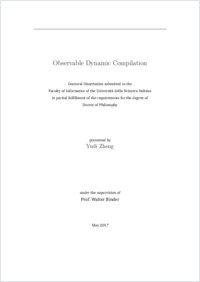Observable dynamic compilation
- Zheng, Yudi
- Binder, Walter (Degree supervisor)
-
02.05.2017
124 p
Thèse de doctorat: Università della Svizzera italiana, 2017
Dynamic compilers
Profiling
Bytecode instrumentation
Intermediate representation
Profile-guided optimization
Deoptimization
English
Managed language platforms such as the Java Virtual Machine rely on a dynamic compiler to achieve high performance. Despite the benefits that dynamic compilation provides, it also introduces some challenges to program profiling. Firstly, profilers based on bytecode instrumentation may yield wrong results in the presence of an optimizing dynamic compiler, either due to not being aware of optimizations, or because the inserted instrumentation code disrupts such optimizations. To avoid such perturbations, we present a technique to make profilers based on bytecode instrumentation aware of the optimizations performed by the dynamic compiler, and make the dynamic compiler aware of the inserted code. We implement our technique for separating inserted instrumentation code from base-program code in Oracle's Graal compiler, integrating our extension into the OpenJDK Graal project. We demonstrate its significance with concrete profilers. On the one hand, we improve accuracy of existing profiling techniques, for example, to quantify the impact of escape analysis on bytecode-level allocation profiling, to analyze object life-times, and to evaluate the impact of method inlining when profiling method invocations. On the other hand, we also illustrate how our technique enables new kinds of profilers, such as a profiler for non-inlined callsites, and a testing framework for locating performance bugs in dynamic compiler implementations. Secondly, the lack of profiling support at the intermediate representation (IR) level complicates the understanding of program behavior in the compiled code. This issue cannot be addressed by bytecode instrumentation because it cannot precisely capture the occurrence of IR-level operations. Binary instrumentation is not suited either, as it lacks a mapping from the collected low-level metrics to higher-level operations of the observed program. To fill this gap, we present an easy-to-use event-based framework for profiling operations at the IR level. We integrate the IR profiling framework in the Graal compiler, together with our instrumentation-separation technique. We illustrate our approach with a profiler that tracks the execution of memory barriers within compiled code. In addition, using a deoptimization profiler based on our IR profiling framework, we conduct an empirical study on deoptimization in the Graal compiler. We focus on situations which cause program execution to switch from machine code to the interpreter, and compare application performance using three different deoptimization strategies which influence the amount of extra compilation work done by Graal. Using an adaptive deoptimization strategy, we manage to improve the average start-up performance of benchmarks from the DaCapo, ScalaBench, and Octane suites by avoiding wasted compilation work. We also find that different deoptimization strategies have little impact on steady- state performance.
- Language
-
- English
- Classification
- Computer science and technology
- License
-
License undefined
- Identifiers
-
- RERO DOC 288796
- URN urn:nbn:ch:rero-006-116130
- ARK ark:/12658/srd1318732
- Persistent URL
- https://n2t.net/ark:/12658/srd1318732
Statistics
Document views: 424
File downloads:
- Texte intégral: 257
